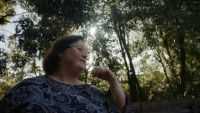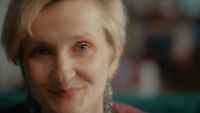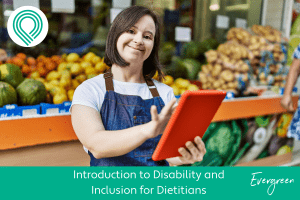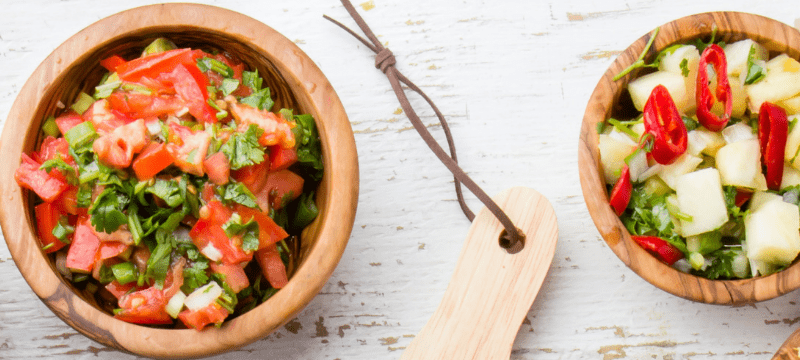
In Australia, 4.4 million people (1 in 6) have a disability. The health sector is undergoing rapid reform and there is an increasing emphasis on the need for all health professionals to better understand and respond to the needs of people with disability.
Currently, there are very few educational opportunities or resources to support dietitians to work safely and effectively with people with disability in contemporary dietetic practice.
To address this gap, in 2020, Dietitians Australia partnered with the Australian Federation of Disability Organisations (AFDO) to develop an education program and resources to support dietitians to work with people with disability.
The project is funded by the Department of Social Services.
The Capacity Building in Disability for Dietitians (CBDD) project aims to enhance dietitians’ knowledge, skills and confidence to respond to the needs of people with disability and improve access to timely, inclusive, relevant and high-quality dietitian services.
Published video introduction to project and course:
 |
Emily shares some of her life with us | Emily's story |
|---|---|---|
 |
Clarke's story, part of the Introduction to disability and inclusion for dietitians online course | Clarke's story |
 |
Michelle provides an overview of the 3 components of the Capacity building for dietitians education program. | Michelle's story |
 |
Tess shares her story regarding vision loss as part of the Introduction to disability and inclusion for dietitians online education program | Tess's story |
 |
Ruby shares their experience living with an invisible disability | Ruby's story |
About the project
The project captured the perspectives of people with disability, family, carers and dietitians, to inform the development of the education program and resources. An Advisory Group informed the development and implementation of the program. Various research and evaluation methods were applied across the life of the project.
Dietitian Australia has used the grant funding to:
- Conduct a needs assessment in June 2020 – July 2021 to inform the development of an education program and resources. This involved a rapid desktop review and consultations with people with disability, families, carers and dietitians.
- Across August 2021 – October 2022 Dietitian’s Australia co-designed an education program to enhance dietitians’ knowledge, skills and confidence to work well with people with disability. This included a 5-module online course, 5 online workshops and a pilot supervision program.
- Across October 2022 – January 2023 the online course, workshops and supervision program were launched.
- Across 2024 a webinar series was launched, in collaboration with AFDO.
- Dietitians Australia is continuing to develop further project activities with our key project partners. The program is set to be completed in mid-2025.
The CBDD project aims to have lasting impact for dietitians and the broader healthcare sector, this includes:
- More informed understanding, knowledgeable and confident dietitians who work well with people with disability
- Better access to high quality, inclusive dietitian services for people with disability
- Education and resources to support dietitians to work in the disability sector.
Researchers from the Centre for Health Service Development (CHSD) were engaged to interview dietitians who had completed the program to explore their experience of the program and its impact on practice. This qualitative study aimed to complement the evaluation conducted by Dietitians Australia.
Key project activities
Online course
Introduction to Disability and Inclusion for Dietitians Course

This self-paced course delivers the learning outcomes to increase the capacity of all dietitians to confidently deliver the best possible nutrition care to people with disability.
There are 5 modules in this course (listed below) and downloadable workbooks:
- Disability foundations
- Health and function
- Communication
- Supporting people with a disability where they live, work and play
- Navigating funding.
Webinar series
Across 2024, Dietitians Australia hosted a series of webinars facilitated by AFDO and Dietitian’s Australia members. These webinars explored a range of perspectives of disability including navigating healthcare and support systems, modern models of care, lived experience, and medical nutrition therapy.
These webinars discuss the diverse experience of disability and working within this sector, with exploring topics such as intellectual disability, tube feeding, neurodiversity, multiple sclerosis and even a gold medal Paralympian!
You can access these webinars on the Dietitians Australia Shop.
In 2025, we are launching more webinars to continue expanding our understanding of disability.
Empowering NDIS Home Tube Fed Clients
Amplifying the Impact of Dietitians within the NDIS
Key Considerations Supporting Neurodivergent Clients
Perform Your Best for Paralympic Success
Supporting Clients with Neurological Disabilities: MS
Application to Practice and Navigating the NDIS: MS Study
Intellectual disability: Implications for Nutrition
Intellectual disability: Nutrition Care Process
Lived Experience of Autism (AFDO facilitated)
Patient Centred Care for Clients with Physical Disabilities (AFDO facilitated)
5 x workshop in practice sessions
We delivered small group workshops with robust discussions and interactive activities including case studies and role plays to deepen knowledge and practical skills:
- NDIS Basics in Practice
- Supporting Clients with Communication Disability in Practice
- Mealtime Management in Practice
- A Focus on Function in Practice
- NDIS Reporting in Practice.
Pilot supervision program
Several supervision sessions were provided to support dietitians to implement learnings in the online course and workshops. Participants recorded their involvement by setting learning goals and engaging in reflective practice.
Co-facilitated Sean and Marley cooking video series
Dietitians Australia teamed up with the Get Down with Sean and Marley YouTube Cooking channel. This video targeted primarily at health professionals, is intended to be used as educational resources to upskill and enhance their capability to work with people with disability to support their nutrition needs. Dietitian Michelle works with Sean, Marley and Chef Cammie to create a nourish bowl. Dietitian Michelle explains to her co-host and viewers how food and nutrition can improve a persons function.
Accessible recipes
To bring the learnings from this project to life, we have used the recipes and meal ideas from the Sean and Marley cooking episode to create accessible recipes for the Nourish Bowl and Watermelon Pizza. There are 6 individual mini recipes that have been translated into Easy English accessible documents.
We would like to thank and acknowledge the work of the Australian Federation Disability Organisation (AFDO) in translating these recipes.


People with disability, family, carers and supporters
Dietitians
Jim Valavanis, Australian Federation of Disability Organisations
Sharon Boyce, community member
Michelle Sedgman, community member
Sue Gebert, Accredited Practising Dietitian
Libby Kent, Accredited Practising Dietitian
Sayne Dalton, Senior Policy Officer and Program Manager
Amelia Weddell, Project Officer
Kathryn Toohey, Project Officer
Professor Karen Walton, University of Wollongong
Cristina Thompson, Centre for Health Service Development, University of Wollongong
Darcy Morris, Centre for Health Service Development, University of Wollongong
Studio3 Learning
Androgogic
Funding source
This project is funded by the Australian Government Department of Social Services. Visit dss.gov.au for more information.
Complaints and inquiries
Feedback and complaints may be directed to the Department of Social Services via complaints@dss.gov.au
Feedback and questions may be directed to the Capacity Building for Dietitians in Disability Project Officer, Amelia Weddell, via aweddell@dietitiansaustralia.org.au
Complaints and concerns regarding any research associated with this project may be directed to ethics@uow.edu.au